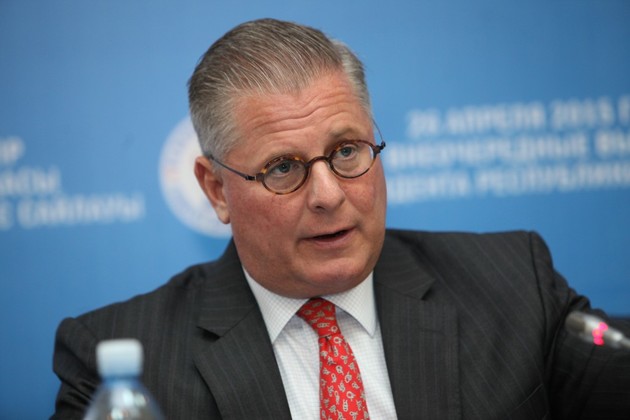Everyone knows that competition at the top is always the hardest. The world leaders in entrepreneurship rankings now have a new competitor: Kazakhstan, as the World Bank announced that Kazakhstan now ranks #25 on its highly-regarded Doing Business report. As Daniel Witt in an article publisheed by Real Clear Markets, while free-market champion Georgia and the three Baltic states: Estonia, Latvia and Lithuania are ahead, Iceland, Russia, and Austria are behind the Eurasian emerging leader.
Kazakhstan performed particularly well in the categories of “starting a business,” “protecting minority investors,” and “enforcing contracts.”This milestone is all the more remarkable given how far Kazakhstan has come in one generation. As someone who has worked in Kazakhstan since 1993, I have witnessed firsthand the amazing transformation in the country’s economy, including the virtual elimination of poverty.
Early, troubled years after independence in 1991 saw an exceptionally severe economic contraction. But that pain, followed by the Asian and Russian financial crises of the late 1990s, nevertheless set Kazakhstan on a new foundation for market-driven and export-led growth.
In 2002, Kazakhstan became the first former Soviet state to receive an investment-grade rating for its bonds. Major investments, such as Chevron’s Tengiz field – now set for a $45 billion expansion to raise production to the equivalent of about a million barrels of oil per day – let the world know that Kazakhstan was open for business and that the country welcomed foreign investment in strategic sectors. Over two decades until 2014, foreign direct investment averaged 8% of GDP per year, according to the OECD – a remarkable achievement for a country in which state enterprises still dominated.
Indeed, the country is blessed with abundant oil, gas, and mineral reserves and vast agricultural lands which remain critically important to the economy. But Kazakhstan is moving towards a future in which natural resources no longer drive the economy alone. Although Kazakhstan is the world’s ninth largest country, with 2.7 million square kilometers of area, its population of 19,000,000 is largely concentrated in larger urban centers that form ideal launching pads for businesses. Kazakhs are an entrepreneurial people, with 30% self-employed in 2017 according to an OECD report.
As the World Bank ranking shows, the new President, Kassym-Jomart Tokayev, has made further economic reform a centerpiece of his policies. This builds on former President Nursultan Nazarbayev’s earlier goal to put Kazakhstan in the top 50 countries for doing business, which it achieved several years ago, and it now stands in the top eighth of economies worldwide.
Among the President’s first actions on taking office was a package of reforms designed to tackle problems in the banking sector. Indeed, the World Bank report noted that access to credit for businesses improved in the last year. And the state privatization program has been reinvigorated.
Economic reform is important in its own right, to help entrepreneurs, investors, and individual citizens, but for Kazakhstan it also has the added benefit of lessening dependence on major export markets such as Russia and China, as well as generating domestic demand in both goods and services. Higher capital spending, notably on housing, has boosted the local economy as well. Kazakhstan has enjoyed rising industrial output even during the pandemic year on-year.
Other indices confirm Kazakhstan’s rising status in the global economy. In the Heritage Foundation’s 2020 Index of Economic Freedom, Kazakhstan is 39th, ahead of eight EU members (including Belgium, Spain, and Italy).
Perhaps the experience of a command economy for 70 years encourages Kazakhstan to move so strongly in the other direction. Kazakhstan is actively pursuing OECD membership and is likely to attain it sooner rather than later.
And the UN’s Human Development Index, measuring social outcomes as well, places Kazakhstan at 50, in the top quarter of countries – ahead of two EU members and countries such as Kuwait, Turkey, and Malaysia. It should become the G-20 observer representing Central Asia.
By any standards, these high rankings are significant achievements. But Kazakhstan still has work to do. Corruption and red tape remain a challenge. As a separate report from the IMD World Competitiveness Center notes, in a year (2019) in which the rankings of many countries (including the United States) fell,“government efficiency” and still-developing infrastructure harm Kazakhstan’s global competitiveness.
Responding to these issues, President Tokayev has pledged “the transformation of the public administration system.” And Prime Minister Mamin, who previously led the national railroad network to achieve equivalence with global peers, is pushing now on road and rail construction, supported by international financial institutions.
Further,the World Bank notes that connecting to water supplies and electricity has become easier for investors in the last two years, yet more needs to be done.
Not content with its current progress, Kazakhstan has set itself an even more ambitious goal: to be among the world’s 30 most advanced economies by mid-century. The good news from the World Bank is both a recognition of the success of economic reforms, and another step towards that broader vision, fully achievable as a new generation of younger, more educated Kazakhs takes the reins in both the political and economic spheres.
Keep an eye on Kazakhstan, an increasingly strong new competitor on the world stage. In the meantime, the best way for foreign investors to mark this milestone is to include Kazakhstan in their investment decisions.
Daniel Witt is the founder and President of the International Tax and Investment Center (ITICnet.org) in Washington. He has worked in Kazakhstan since 1993.






